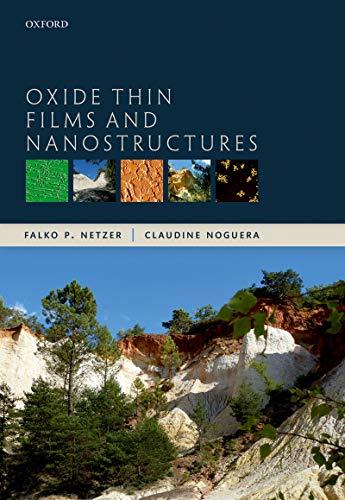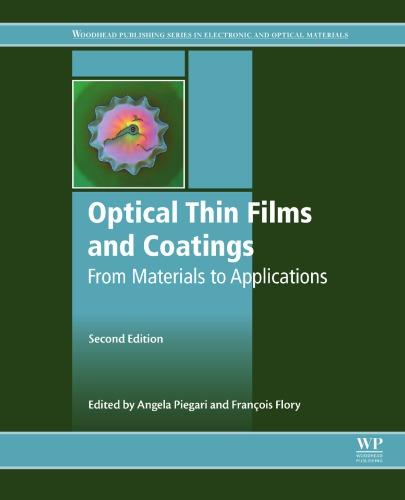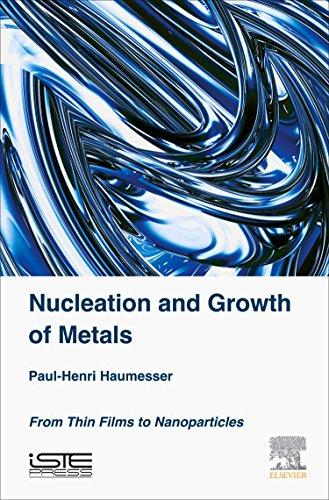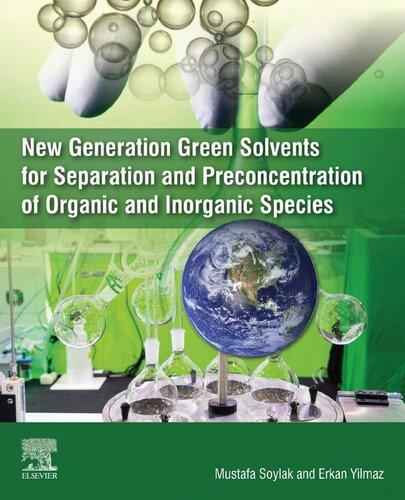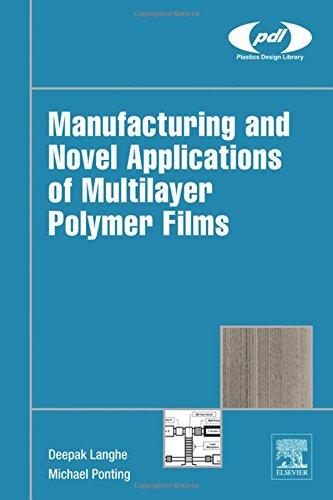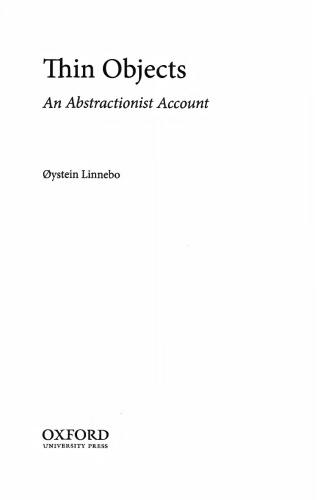InorganicandOrganicThinFilms
Fundamentals,Fabrication,andApplications
Editedby YujunSong
Volume2
Editor
YujunSong UniversityofScienceandTechnologyBeijing SchoolofMathematicsandPhysics
30XueyuanRoad
HaidianDistrict
100083Beijing China
Cover
CoverImage:©SanerG/iStock/GettyImages
Allbookspublishedby WILEY-VCH arecarefully produced.Nevertheless,authors,editors,and publisherdonotwarranttheinformationcontained inthesebooks,includingthisbook,tobefreeof errors.Readersareadvisedtokeepinmindthat statements,data,illustrations,proceduraldetailsor otheritemsmayinadvertentlybeinaccurate.
LibraryofCongressCardNo.: appliedfor
BritishLibraryCataloguing-in-PublicationData Acataloguerecordforthisbookisavailablefromthe BritishLibrary.
BibliographicinformationpublishedbytheDeutsche Nationalbibliothek
TheDeutscheNationalbibliothekliststhis publicationintheDeutscheNationalbibliografie; detailedbibliographicdataareavailableonthe Internetat<http://dnb.d-nb.de>.
©2021WILEY-VCHGmbH,Boschstr.12,69469 Weinheim,Germany
Allrightsreserved(includingthoseoftranslation intootherlanguages).Nopartofthisbookmaybe reproducedinanyform–byphotoprinting, microfilm,oranyothermeans–nortransmittedor translatedintoamachinelanguagewithoutwritten permissionfromthepublishers.Registerednames, trademarks,etc.usedinthisbook,evenwhennot specificallymarkedassuch,arenottobeconsidered unprotectedbylaw.
PrintISBN: 978-3-527-34497-0
ePDFISBN: 978-3-527-34501-4
ePubISBN: 978-3-527-34499-4
oBookISBN: 978-3-527-34498-7
Typesetting SPiGlobal,Chennai,India PrintingandBinding
Printedonacid-freepaper
10987654321
Contents
Volume1
Biography xv
Preface xvii
Acknowledgments xxi
1Introduction:ProgressofThinFilmsandCoatings 1
YujunSong
1.1Introduction 1
1.2ThinFilmsfortheInnovationofInformationTechnology 2
1.3ThinFilmsforUltrasensitiveSensingDevices 7
1.4ThinFilmsforSustainableEnergyApplication 9
1.5ThinFilmsandCoatingsforKeySourcesandEcological EnvironmentofEarth 28
1.6ThinFilmsandCoatingsforBiomedicalEngineeringandLife Science 32
1.7ThinFilmsandCoatingsforNationalDefenseandHomeland Security 38
Acknowledgments 41
ListofAbbreviations 42
References 44
2FundamentalinFunctionalThinFilmsandCoatings 59
WeiweiZhangandYujunSong
2.1Introduction 59
2.2TheoryofMagneto-electricCouplinginMagneticThinFilms 59
2.3TheoryofElectronicThinFilms:ElectronicPercolationand SpintronicTheoryontheSemiconductorThinFilm 60
2.4TheoryofMetalStructuralThinFilms:Metamaterialsandthe NegativePermeabilityTheoryandMaxwellTheory 62
2.5TheoryofSurfacePlasmonResonanceandMagnetoplasmonic ThinFilms 66
2.6HeterojunctionTheory 73
2.7TopologicalInsulator,TopologicalSemi-metal,and Perovskite 74
2.8AcousticTheory 77
2.9TheoryofMagnetoacousticandPhotoacousticCoupling 79
2.9.1TheMechanismoftheSoundPressureinthePresenceofthe PulseMagneticField 80
2.9.2TheMechanismoftheSoundPressureinthePresenceofthe PulsedMagneticFieldandStaticMagneticField 80
2.10TheoryofAcoustoopticEffect 82
2.11MagnetothermalThinFilms:PhononThermalTheory 83
2.12TheoryofThermoelectricEffect 84
2.13ThermalBarrierInsulationTheoryforTBCCoating 86
2.14PermeabilityTheory:FickFirstDiffusionTheoryandFickSecond DiffusionTheory 87
2.15Multi-physicalFieldCouplingTheoryandSimulationSoftware Introduction 88 Acknowledgments 90 ListofAbbreviation 91 References 91
3MultilayeredMagneticThinFilmsforElectronTransport ControlandSignalSensing:FromGMR,CMR,TMRto QuantumAnomalousHolzerEffect 95 WeiweiZhangandYujunSong
3.1Introduction 95
3.2MultilayeredMagneticThinFilmfortheElectronTransport ControlandSensingBasedonMagnetoresistance(GMR) Effect 96
3.2.1IntroductionofGMR 96
3.2.2FabricationofGMRMultilayeredThinFilms 97
3.2.2.1MBEMethodfortheFabricationoftheGMRDevices 99
3.2.2.2MagnetronSputteringMethodfortheFabricationofGMR Devices 99
3.2.3GMRApplicationsforSensors 100
3.3MultilayeredMagneticThinFilmfortheElectronTransport ControlandSensingBasedonColossalMagnetoresistance(CMR) Effect 102
3.3.1IntroductionofCMR 102
3.3.2FabricationofMultilayeredThinFilmsBasedonCMR Effect 103
3.3.3CMRApplications 105
3.4MultilayeredMagneticThinFilmfortheElectronTransport ControlandSensingBasedonColossalTunneling Magnetoresistance(TMR)Effect 106
3.4.1IntroductionofTMR 106
3.4.2FabricationofMultilayeredThinFilmsoftheTMREffect 107
3.4.3TMRApplications 110
3.5TheMultilayeredMagneticThinFilmBasedonQuantum AnomalousHolzerEffect(QAHE) 111
3.6SummaryandPerspectives 112
Acknowledgments 113
ListofAbbreviationandSymbol 114 References 114
4Bismuth-SubstitutedIronGarnetFilmsfor Magnetophotonics:PartA–FabricationMethodsand MicrostructurePropertyStudy 125 AndreyA.Voronov,T.Mikhailova,OlgaV.Borovkova,AlexanderN. Shaposhnikov,VladimirN.Berzhansky,andVladimirI.Belotelov
4.1Introduction 125
4.2FabricationMethods 126
4.2.1SynthesisTechnologyandConditionsofBismuth-substitutedIron GarnetFilms 126
4.2.2FabricationofFabry–Perot1D-MPCwithBiIGBilayer 135
4.2.3FabricationofTamm1D-MPCwithBiIGBilayer 136
4.3PropertiesoftheStructures 139
4.3.1Magneto-opticalPropertiesofFP-1D-MPCs 139
4.3.2Magneto-opticalPropertiesofT-1D-MPCswithBiIGBilayer 143
4.3.3AnincreaseoftheMagneto-opticalResponseintheUltrathin Films 145
Acknowledgment 155
ListofAbbreviationsandSymbols 156 References 156
Contents
5Bismuth-substitutedIronGarnetFilmsfor Magnetophotonics:PartB–Devicesand Applications 161 AndreyA.Voronov,DariaO.Ignatyeva,NikolayA.Gusev,PetrM. Vetoshko,NazarV.Lugovskoy,YujunSong,VladimirN.Berzhansky, andVladimirI.Belotelov
5.1DeviceAssembleandApplicationofIronGarnetFilmsfor UltrasensitiveMagnetometry 161
5.2DevicesAssembleandApplicationofBiIGFilmsfor Biosensing 174
5.3DevicesAssembleandApplicationofIronGarnetFilmsfor Magneto-opticalEddyCurrentFlawDetection 178
5.3.1Introduction 178
5.3.2ExperimentalPart 179
5.3.3Introscope 180
5.3.4PhysicalPropertiesofMOSensors 181
5.3.5TheSensoryPropertiesoftheEAFilms 184
5.3.5.1TheEffectofAlternatingFieldAmplitude 184
5.3.5.2TheEffectofAlternatingFieldFrequency 184
5.3.5.3TheEffectofBiasMagneticField 185
5.3.5.4DynamicDomainsintheGarnetFilmSensorElement 186
5.3.6TheSensoryPropertiesoftheEPFilms 188
5.3.7ApplicationsofMOEC:ImagingofWelds 188
5.3.7.1NondefectiveWelds 188
5.3.7.2DefectiveWelds 190
5.3.8SimulationofECMagneticFieldsinSampleswithDefects 191
5.4ConclusionsandPerspectives 193 Acknowledgments 193
ListofAbbreviationandSymbol 194 References 194
6MEMS,NEMS,AEMS,andQuantumFilmsfortheNext GenerationofComputingandInformation Technology 199 HaishuaiChai,JunmeiWang,andYujunSong
6.1Introduction 199
6.2TypicalFabricationMethodsforMEMS,NEMS,andAEMS 200
6.2.1FabricationofMicrostructures 200
6.2.2FabricationProcessofComplementaryMetalOxide Semiconductor(CMOS) 203
6.2.3FabricationProcessofFieldEmissionTransistors(FET) 203
6.2.4GiantMagnetoresistance(GMR)SensorandItsFabrication Method 204
6.3FromMEMStoNEMSandthentoQuantumFilmsandAEMSfor theNextGenerationofInformationTechnology 205
6.3.1TheTrendofMicrosystemIntegrationTechnology 205
6.3.2TheDevelopmentTrendofMicrosystemPackaging Technology 207
6.3.3ChallengesintheDevelopmentofMicrosystems Technology 207
6.4NEMSandAEM 210
6.4.1NEMS 210
6.4.2AEMS 211
6.5QuantumFilmsforInformationTechnology 212
6.6SummaryandPerspectives 214 Acknowledgments 214 ListofAbbreviations 214 References 215
7MetamaterialorMetastructuralThinFilmsforEMWave Control 221 MenglinL.N.Chen,LuzhouChen,XunwangDang,MaokunLi,LiJun Jiang,andWeiE.I.Sha
7.1Introduction 221
7.2ModelingandSynthesisMethodsofMetasurfaces 222
7.2.1JonesVectorandJonesMatrix 223
7.2.2PolarizabilityModel 224
7.2.3SusceptibilityModel 225
7.2.4EquivalentImpedanceModel 226
7.3SimulationAlgorithmsofQuasi-periodicElectromagnetic Surfaces 227
7.3.1IntroductiontoEMSurfaces 227
7.3.2DesignofQuasi-periodicEMSurfaces 228
7.3.3SimulationAlgorithmsofQuasi-periodicEMSurfaces 229
7.3.4ReviewofSimulationAlgorithmsofQuasi-periodicEM Surfaces 230
7.4OrbitalAngularMomentumofElectromagneticWaves: GenerationandDetection 233
7.4.1Introduction 233
7.4.2GenerationofOrbitalAngularMomentum 234
7.4.2.1Geometric-phaseMetasurfaces 234
7.4.2.2PhotonicCrystals 237
7.4.3DetectionofOrbitalAngularMomentum 238
x Contents
7.5ApplicationinSpontaneousEmissionModification 241
7.5.1SpontaneousEmissioninInhomogeneousElectromagnetic Environment 241
7.5.2CalculationofSpontaneousEmissionRate 242
7.5.3MetamaterialsEnhanceSpontaneousEmission 242
7.5.4MetasurfacesEnhanceSpontaneousEmission 243
7.5.5OtherPotentialApplicationinQuantumOptics 245
7.6ConclusionandPerspectives 245 Acknowledgments 245
ListofAbbreviations 246 References 247
8SemiconductorThinFilmsforInformation
Technology 257 NaChen
8.1Introduction 257
8.2FabricationofSemiconductorThinFilms 258
8.2.1MolecularBeamEpitaxy(MBE) 259
8.2.2MagnetronSputtering 259
8.2.3Metal–OrganicChemicalVaporDeposition(MOCVD) 260
8.3NonmagneticSemiconductorThinFilmsandTypical Applications 261
8.3.1SemiconductorThinFilmsforLight-emittingDevices 261
8.3.2ThinFilmTransistorsforDisplays 263
8.3.3Phase-changeSemiconductorThinFilms 264
8.3.4SemiconductorThinFilmsforSensors 268
8.4MagneticSemiconductorThinFilms 269
8.4.1DilutedMagneticSemiconductors 270
8.4.2AmorphousMagneticSemiconductors 272
8.4.3Phase-changeAmorphousMagneticSemiconductorThin Films 275
8.4.4MagneticSemiconductorThinFilm-basedSpintronic Devices 277
8.4.5ProspectiveforMagneticSemiconductors 279
8.5ConclusionandOutlook 280
ListofAbbreviations 280 References 280
9GlassTransitioninOrganicSemiconductorThin Films 285 Han-NanYangandZheng-HongLu
9.1Introduction 285
9.2DeterminationofGlassTransitionTemperatureinOrganicThin Films 287
9.3ModelforPredictingGlassTransitionTemperatureof Organic–OrganicComposites 291
9.4ModelforPredictingGlassTransitionTemperatureof Nano-organicComposites 292
9.5Summary 295
Acknowledgments 296
ListofAbbreviations 296 References 296
10ThermoelectricFilmsforElectricityGeneration 299
MetinYurddaskal,MelisYurddaskal,OzanYilmaz,andSerdar Gultekin
10.1Introduction 299
10.2Thermoelectricity 300
10.3OverviewofInorganicandOrganicThermoelectricsforThin Films 301
10.3.1TheSeebeckEffect 301
10.3.2ThePeltierEffect 307
10.3.3TheThomsonEffect 309
10.4ClassificationofThinFilmThermoelectric(TE)Materials 311
10.4.1InorganicThermoelectricThinFilms 311
10.4.1.1Bi–Te-BasedSuperlattices 311
10.4.1.2CobaltOxide-BasedThinFilms 311
10.4.1.3Zn-BasedThinFilms 312
10.4.1.4Cu-BasedThinFilms 312
10.4.2Organic-basedThinFilmTEMaterials 313
10.4.2.1PolyacetyleneandPolyaniline 313
10.4.2.2Poly(3,4-ethylenedioxythiophene) 313
10.4.2.3PolypyrroleandPolythiophene 314
10.4.2.4Othern-TypePolymers 314
10.4.3Inorganic–OrganicCompositeThermoelectricThinFilm Materials 314
10.4.3.1Metal–OrganicFrameworks 315
10.4.3.2CarbonNanotube–PolymerComposites 315
10.5ApplicationsofThermoelectricMaterials 315
10.5.1ThermoelectricCooling 316
10.5.2ThermoelectricPowerGeneration 316
10.5.3OrganicInverterCircuit 316
10.5.4OrganicLight-EmittingDiode(OLED) 318
10.5.5OrganicRadioFrequencyIdentificationTags 319
10.5.6OrganicDNASensors 319
10.5.7Limitations 320
10.6TechniquesofThinFilmDepositionforThermoelectric Device 320
10.6.1Sputtering 320
10.6.2MolecularBeamEpitaxy(MBE) 321
10.6.3Metal–OrganicChemicalVaporDeposition(MOCVD) 321
10.6.4ElectrochemicalDeposition(ECD) 323
10.6.5FlashEvaporation(FE) 323
10.6.6ThermalEvaporation 324
10.6.7PulsedLaserDeposition(PLD) 324
10.7ConclusionandFutureTrends 326 ListofAbbreviationsandSymbols 327 References 328
Volume2
Biography xv Preface xvii Acknowledgments xxi
11Template-assistedFabricationofNanostructureThin FilmsforUltrasensitiveDetectionofChemicalsand Biomolecules:PartA–Template-assisted NanoimprintingTechnologyforFunctionalThin Films 339
XiaominZhu,XinhuaChen,AndreyA.Voronov,VladimirI.Belotelov, andYujunSong
12Template-assistedFabricationofNanostructuredThin FilmsforUltrasensitiveDetectionofChemicalsand Biomolecules:PartB–DetectionofChemicalsand BiomoleculesBasedonNanostructuredThinFilms 381
XiaominZhu,XinhuaChen,andYujunSong
13Polymer-basedFilmsforArtificialIntelligence 411 RanLiu,JunmeiWang,andYujunSong
14SelectivePermeableThinFilmsandMembranes 447 QiongWu,XiaoxiongZhao,LifanPeng,andYujunSong
15Biomass-DerivedFunctionalFilmsandCoatings 489
GaoXiao
16PolymerCompositeCoatingforAnti-marineandRelated OrganismCorrosion 511
KaifengChen,ZhipengXie,YuLiang,JingjingWang,andHaiyan Zhuang
17AnechoicCoatingforUnderwaterVehicles 549
WeiweiZhangandYujunSong
18ThinFilmsand/orCoatingforElectromagnetic InterferenceandStealth 587
JunmeiWangandYujunSong
19ThermalBarrierCoatingforAerialandAerospace Engine 615
ZaidaoLiandYujunSong
20PerspectivesforThinFilmsandCoatings 647
YujunSong
Index 681
Contents
Volume1
Biography xv
Preface xvii
Acknowledgments xxi
1Introduction:ProgressofThinFilmsandCoatings 1 YujunSong
2FundamentalinFunctionalThinFilmsandCoatings 59 WeiweiZhangandYujunSong
3MultilayeredMagneticThinFilmsforElectronTransport ControlandSignalSensing:FromGMR,CMR,TMRto QuantumAnomalousHolzerEffect 95 WeiweiZhangandYujunSong
4Bismuth-SubstitutedIronGarnetFilmsfor Magnetophotonics:PartA–FabricationMethodsand MicrostructurePropertyStudy 125 AndreyA.Voronov,T.Mikhailova,OlgaV.Borovkova,AlexanderN. Shaposhnikov,VladimirN.Berzhansky,andVladimirI.Belotelov
5Bismuth-substitutedIronGarnetFilmsfor Magnetophotonics:PartB–Devicesand Applications 161
AndreyA.Voronov,DariaO.Ignatyeva,NikolayA.Gusev,PetrM. Vetoshko,NazarV.Lugovskoy,YujunSong,VladimirN.Berzhansky, andVladimirI.Belotelov
vi Contents
6MEMS,NEMS,AEMS,andQuantumFilmsfortheNext GenerationofComputingandInformation Technology 199 HaishuaiChai,JunmeiWang,andYujunSong
7MetamaterialorMetastructuralThinFilmsforEMWave Control 221 MenglinL.N.Chen,LuzhouChen,XunwangDang,MaokunLi,LiJun Jiang,andWeiE.I.Sha
8SemiconductorThinFilmsforInformation Technology 257 NaChen
9GlassTransitioninOrganicSemiconductorThin Films 285 Han-NanYangandZheng-HongLu
10ThermoelectricFilmsforElectricityGeneration 299 MetinYurddaskal,MelisYurddaskal,OzanYilmaz,andSerdar Gultekin
Volume2
Biography xv Preface xvii Acknowledgments xxi
11Template-assistedFabricationofNanostructureThin FilmsforUltrasensitiveDetectionofChemicalsand Biomolecules:PartA–Template-assisted NanoimprintingTechnologyforFunctionalThin Films 339 XiaominZhu,XinhuaChen,AndreyA.Voronov,VladimirI.Belotelov, andYujunSong
11.1DevelopmentofTemplate-assistedNanoimprinting Technology 339
11.2NanosphereLithography(NSL) 340
11.2.1SizeandShapeControlledFabricationofNanomaterialsvia NSL 340
11.2.2Multi-hierarchyMicroWindows(MHMW)forSingle Nanostructureand/orArrayIdentification 344
11.2.3IdentificationofLocalizedSurfacePlasmonResonance(LSPR)of SingleNobleMetalNanoparticlesand/orNanoarraysby MHMW-assistedNSL 346
11.2.4DevelopmentofNSLforNanomaterialsSynthesis 351
11.2.4.1AqueousPhaseAgNanoparticleswithControlledShapes FabricatedbyNSL 351
11.2.4.2UltrathinNanoporeArrayswithUniformSize 356
11.2.4.3FabricationofPeriodicUniformNanoporousFilmswith ControlledLayers 357
11.3AnodicAluminumoxide(AAO)Template-assisted Nanoimprinting 359
11.3.1IntroduceofAAOTemplate 359
11.3.2PreparationMethods 361
11.3.2.1PreparationofAnodicAluminaTemplate 361
11.3.2.2PreparationofThinFilmSubstratesforSurface-enhancedRaman Scattering 362
11.3.3PreparationandCharacterizationofNanoporousGoldThinFilms BasedonAnodicAluminaTemplate(AAO) 363
11.3.3.1SubstrateTransferandCharacterizationofNanoporousGold ThinFilms 364
11.3.3.2PreparationandCharacterizationofAqueousSphericalGold Nanoparticles 367
11.3.3.3CompositeofNanoporousGoldThinFilmsandAqueousGold Nanoparticles 367
11.3.4AAOTemplate-assistedFabricationofUltra-denseNanoparticle ArrayedThinFilms 367
11.3.5AAOTemplate-assistedFabricationofSemiconductiveNanowire ThinFilms 371
11.4SummaryandPerspective 376 Acknowledgments 377 ListofAbbreviationsandSymbols 378 References 378
12Template-assistedFabricationofNanostructuredThin FilmsforUltrasensitiveDetectionofChemicalsand Biomolecules:PartB–DetectionofChemicalsand BiomoleculesBasedonNanostructuredThinFilms 381 XiaominZhu,XinhuaChen,andYujunSong
12.1Introduction 381
12.2NanostructuredThinFilmswithEnhancedMagneto-opticalKerr Effect 381
12.3SurfacePlasmon-enhancedMagneto-opticalKerrEffectfor ChemicalAnalysis 386
12.4TheApplicationofAAOintheDetectionofBiologicalCells 388
12.4.1DifficultiesandBottlenecksinCancerTreatment 388
12.4.2Label-freeReflectometricInterferenceMicrochipBiosensorBased onNanoporousAluminaforDetectionofCirculatingTumor Cells 389
12.4.3SurfaceandInterfaceEngineeringMultilayeredNanoporeFilms forEnhancedFabry PérotInterferencesforBiological Application 393
12.5NanostructuredThinFilmsforSERS 394
12.5.1IntroductionofSERS 394
12.5.2DevelopmentNanostructuredThinFilmsforSERS 396
12.5.3PreparationofSERSThinFilmSubstrates 397
12.5.4CharacterizationsofSERS 398
12.5.4.1PropertiesofPorousGoldNanofilmswithCompositeAqueous GoldNanoparticlesinSERSBasedonPMMASubstrate 398
12.5.4.2Surface-enhancedRamanPropertiesofPorousGoldNanofilms andTheirCompositeAqueousGoldNanoparticlesBasedon PDMSSubstrate 399
12.5.5ChemicalandBiologicalApplicationofSERSBasedon NanostructuredThinFilms 401
12.5.5.1ApplicationofSERSinIonDetection 401
12.5.5.2ApplicationofSERSinEnvironmentalPollution 401
12.5.5.3SERSDetectionofR6GonMagneto-opticalThinFilmswith Nanoholes 402
12.5.5.4ApplicationofSERSinCancerCellDetection 402
12.6SummaryandPerspective 405 Acknowledgments 406 ListofAbbreviationsandSymbols 406 References 407
13Polymer-basedFilmsforArtificialIntelligence 411 RanLiu,JunmeiWang,andYujunSong
13.1Introduction 411
13.2PreparationandIntegrationMethodsofSmartPolymerThin FilmsandCoatingsforAI 412
13.2.1PreparationofMultifunctionalPolymerThinFilmsand Coatings 412
13.2.2IntegrationofSmartDevicesforAI 413
13.3ThinFilmsorCoatingsforAI+ BiologicalApplication 415
13.3.1TactileSensor(forArtificialSkin) 415
13.3.2ThermalSensor(forTemperatureMonitoring) 417
13.3.3HumanThermoregulation 418
13.3.4BiosensorFilmSubstrate 421
13.3.5Bio-IntegratedWearableSensors 422
13.4ThinFilmsorCoatingsforAI+ EnvironmentalProtection 425
13.4.1ThinFilmsorCoatingsforAI+ EnvironmentalMonitoring 425
13.4.1.1UltravioletRadiationMonitoring 425
13.4.1.2ExplosivesDetection 426
13.4.1.3AmmoniaSensor 428
13.4.2ThinFilmsorCoatingsforAI+ WastewaterTreatment 428
13.4.2.1EfficientDegradationofComplexPhthalocyanineDye Wastewater 428
13.4.2.2EfficientAdsorptionofPatulin 429
13.4.3ThinFilmsorCoatingsforAI+ SeawaterDesalination 430
13.5ThinFilmsorCoatingsforAI+ Energy 431
13.5.1ThinFilmsforAI+ SolarEnergy 431
13.5.2ThinFilmsforAI+ Capacitor 432
13.5.3Thin-FilmThermoelectricDevices 434
13.6ArtificialIntelligenceforInformationTechnology 435
13.6.1ArtificialIntelligenceforOpticalPolymer-basedFilms 435
13.6.2AI+ SmartDisplay(PlasticLiquidCrystalDisplay) 436
13.6.3High-efficiencyTHz-WaveModulators 438
13.6.4ThermalManagementforElectronicEquipment 439
13.7SummaryandPerspectivesofThinFilmsandCoatingsfor AI+ 439
Acknowledgments 440
ListofAbbreviations 441 References 442
14SelectivePermeableThinFilmsandMembranes 447 QiongWu,XiaoxiongZhao,LifanPeng,andYujunSong
14.1Introduction 447
14.2ThePrincipleofMembraneSeparation 449
14.3TypesofSelectivePermeableMembranes 452
14.3.1TypesandCharacteristicsofMembranes 452
14.3.2TheRiseofNewMembranes 453
14.3.2.1PolymerSeparationMembrane 453
14.3.2.2PolymerFunctionalMembrane 454
14.3.2.3ThePlasmaPolymerFilm 454
14.4PreparationMethodsofVarietiesofSelectivePermeable Membranes 456
14.4.1PhaseInversion 456
x Contents
14.4.2InterfacialPolymerization 456
14.4.3ChemicalModification 456
14.5ApplicationoftheSelectivePermeableMembranes 457
14.5.1PurificationofWater 457
14.5.2ApplicationinGasSeparation 469
14.5.2.1OxygenSeparation 470
14.5.2.2CO2 Separation 472
14.5.3ApplicationintheSeparationandPurificationofLowMolecular Substances 476
14.5.3.1IsolationandPurificationofOligosaccharides 476
14.5.3.2Fructooligosaccharides 477
14.5.3.3Galactooligosaccharides 477
14.5.3.4IsolationandPurificationofAminoAcids 477
14.5.3.5ApplicationintheIsolationandPurificationofAntibiotics 478
14.6CurrentStatusandRecentProgressandPerspectives 479 Acknowledgments 481
ListofAbbreviationsandSymbols 482 References 483
15Biomass-DerivedFunctionalFilmsandCoatings 489 GaoXiao
15.1Introduction 489
15.2Biomass-derivedPolymers 490
15.2.1Collagen 491
15.2.2CelluloseNanofibrils 492
15.2.3Pectin 494
15.2.4Starch 495
15.2.5Chitosan 496
15.2.6Xylan 497
15.2.7Lignin 498
15.3CoatingTechnologiesofBiomassThinFilms 500
15.3.1Sol–GelCoatingMethod 500
15.3.2AtomicLayerDeposition(ALD) 501
15.3.3MultilayersCoatingMethod 502
15.4DegradableBiomass-derivedFunctionalizedFilms 502
15.4.1Polysaccharide-basedFilms 502
15.4.2Protein-,PigSkinGelatin-,Lipid-basedFilms 503
15.4.3BiomassPlasticsFilms 503
15.4.4Cellulose-basedFilms 504 Acknowledgments 505 References 505
16PolymerCompositeCoatingforAnti-marineandRelated OrganismCorrosion 511
KaifengChen,ZhipengXie,YuLiang,JingjingWang,andHaiyan Zhuang
16.1Introduction 511
16.2MicrobialCorrosionandProtection 512
16.2.1PrimaryMucosa-formingOrganismsandTheirAttachment 512
16.2.2OverviewofFoulingBiologicalControl 513
16.3Anti-moldCoating 516
16.3.1SiliconeAnti-moldCoating 517
16.3.2AcrylicMold-proofCoating 517
16.3.3PolyurethaneAnti-moldCoating 517
16.3.4Epoxy-basedMold-proofCoating 517
16.3.5DevelopmentTrendofAnti-moldCoatings 518
16.4AntifoulingCoatings 518
16.4.1MainTypesandSelectionofAntifoulingAgents 518
16.4.2MainTypesandSelectionofAntifoulingCoatings 520
16.4.2.1Abrasion-ResistantAntifoulingCoating 520
16.4.2.2Self-polishingAntifouling 523
16.4.2.3FoulingReleaseTypeAntifoulingPaint 531
16.4.3DevelopmentTrendofAntifoulingTechnology 535
16.4.3.1AntifoulingAgentDesign 535
16.4.3.2GelMixedFoulingReleaseTypeAntifoulingPaint 538
16.4.3.3SurfaceMicrostructureBionicAntifoulingPaint 539
16.4.3.4UVAntifoulingTechnology 540
16.5SummaryandProspects 540
ListofAbbreviations 541 References 541
17AnechoicCoatingforUnderwaterVehicles 549 WeiweiZhangandYujunSong
17.1Introduction 549
17.2FundamentalPhysicsforSonarSystem:Echolocationand DopplerEffect 552
17.2.1TypesandConstructionofSonarSystems 553
17.2.2IntroductionofSomeTypicalSonarSystems 555
17.2.3ThreatfromAdvancedHostileSonarSystem 565
17.3BasicPhysicsofAnechoicCoatings 573
17.4DevelopmentofStructureandMaterialsDesignforAnechoic Coatings 574
17.4.1PerspectivefortheSonarSystemandAnechoicCoating Development 582
Acknowledgments 582
ListofAbbreviations 583 References 583
18ThinFilmsand/orCoatingforElectromagnetic InterferenceandStealth 587
JunmeiWangandYujunSong
18.1Introduction 587
18.2EMIShieldingMaterials 589
18.2.1BasicTheoryofElectromagneticShielding 589
18.2.2EMIShieldingMaterials 591
18.2.2.1SurfaceCoatingFilmShieldingMaterial 591
18.2.2.2FerromagneticMaterialandGoodMetallicConductor Material 591
18.2.2.3ConductiveCoatingShieldingMaterials 592
18.2.2.4CompositeShieldingMaterials 592
18.3StealthCoatings 599
18.3.1RadarStealthCoatings 600
18.3.1.1Radar-AbsorbingMaterials 601
18.3.1.2RadioisotopeRAM 604
18.3.1.3Carbonaceous-BasedRAM 604
18.3.2TheDevelopmentofStealthCoating 606
18.3.2.1NegativeRefractiveStealth 606
18.3.2.2MultibandAbsorbingMaterial 607
18.3.2.3PlasmonActiveStealth 607
18.4SummaryandProspects 608
Acknowledgments 608
ListofAbbreviationsandSymbols 608 References 609
19ThermalBarrierCoatingforAerialandAerospace Engine 615
ZaidaoLiandYujunSong
19.1Introduction 615
19.2SuperalloySubstratesforTBCs 618
19.3TBCSystemCompositions 619
19.4ApplicationsofTBCs 620
19.5ProcessingTechniquesforTBCs 621
19.5.1ElectronBeam-PhysicalVaporDeposition(EB-PVD) 621
19.5.2PlasmaSpraying(PS)Process 624
19.5.3SolutionPrecursorPlasmaSpraying(SPPS)Process 627
19.5.4SuspensionPlasmaSpraying(SPS) 629
19.6ThermalTransportinTBCs 633
19.7SummaryandPerspectives 635
Acknowledgments 637
ListofAbbreviations 637 References 637
20PerspectivesforThinFilmsandCoatings 647
YujunSong
20.1Introduction 647
20.2DevelopmentoftheSubversiveNovelConceptsforthe TheoreticalandTechnologicalBreakthroughandNewFindings ofThinFilmsandCoatings 647
20.3DevelopmentofHighlyPreciseFabricationTechniquesforThin FilmsandCoatings 650
20.4PerspectiveintheDevelopmentof High-Spatiotemporal-ResolutionCharacterizationMethodsfor MicrostructuresandProperties 655
20.5PerspectivesintheFurtherStudyofRelationshipBetween MicrostructureandProperty 661
20.6PerspectivesofThinFilmsandCoatingsPromotingtheModern TechnologicalInnovationandtheSocietyProgress 668
Acknowledgments 671
ListofAbbreviations 671
References 672
Index 681
Biography

Dr.YujunSongiscurrentlyafull-timeProfessorinPhysics andAppliedPhysicsatUniversityofScienceandTechnologyBeijing(USTB),DeputyDirectoroftheCenterforModernPhysicsResearchofUSTB,andDirectoroftheZhejiang KeyLaboratoryforPulsedPowerTechnologyTranslational Medicine.AfterobtaininghisPhDdegreeinMaterialsScienceandEngineeringin2000,Dr.Songhassuccessively studied/workedattheCenterforAdvancedMicrostructures andDevicesofLouisianaStateUniversity,OldDominion University,BeihangUniversity,UniversityofToronto,and HarvardUniversity,etc.Hisresearchareasarefocusingintheintegratedinnovationofmodernphysicsfusingintobiomedicine,informationtechnology,and energy/catalysismediatedbynovelnanomaterialandhighprecisefabricationtechnology,particularlythenanomedicinesmediatingultra-strongpulsedfieldactivatingimmunogenicityfornoveltherapyofintractablediseases.Dr.Songhasbeen responsibleformorethan30fundsasPIorco-PI,suchastheNationalS&TMajor Project,theNSFC–BRICSSTIFrameworkProgram,theNationalNaturalScience FoundationofChina.Healsotookpartinmanyspecialfundsasonekeyscientist, suchasthemajorprojectonbio-nanoscienceofNIH:thestudyofbiomolecular transportmechanismbynanobiomolecularprobesfunded,themajorprojecton nanoscienceofNSF:Thedesignandpreparationofnanoopticalbiomoleculeprobe forbiomoleculartransportstudy,themajorprojectonbiosensorofDARPA:design andfabricationofGMRbiosensor,theNSF–EPSCoRprojectMicrofluidicsynthesis ofmagneticnanoparticlesandtheirapplicationincancerdiagnosisandtherapy.
Preface
Duringthepastdecades,greatprogresshasbeenachievedinpromotingthin filmsandcoatingstowardnewtechnologicalinnovationandthedevelopment ofbasictheoriessuchasthemagnetoplasmontechnologyandthequantum anomalousHolzereffect.AstoldbyConfucius,“ifamankeepscherishinghisold knowledge,soascontinuallytobeacquiringnew,hemaybeateacherofothers.” Withengineersandscientistsservingasboththinkersandpractitioners,itisonly fittingthattherecentprogressinthefundamentalphysicsandchemistryofthe microstructure-dependentpropertyofthinfilmsandcoatingsbesummarized, includingtheirsuccessfulapplicationsthatwillfeedbacktopromotethedeeper fundamentalstudyonthemicrostructure-propertyrelationshipofthisvividfield towardgreaterachievementsintheirapplications.
Thinfilmsaremicroscopicallythinlayersofmaterialsthataredepositedontoa metal,ceramic,semiconductor,polymersubstrateoralayeronasupportingliquid. Thesehavebeendevelopedwiththicknessrangingfromoneatom/moleculelayerto millionsofatoms/moleculelayers,i.e.fromhundredsofmicrometers(μm:10 6 m) tonanometers(nm:10 9 m)orevenatomiclayerthin(10 10 m;e.g.atomicelectronic mechanics).Thinfilmscanbeconductiveordielectric(non-conductive),whichare usedforadvancedelectronicand/oroptoelectroniccomponents(e.g.capacitor,resistor,coil,cryotron,transistors),devices,orcircuitsforvariousapplications(e.g.computing,sensing,signal/energy/masstransmittingortransportingorexchanging). Ontheotherhand,coatingsonthesurfaceofsubstratescreateorimprovecorrosionprotection,heatandradiationresistance,thermalmanagement,electromagneticresponses(e.g.stealthordetecting),acousticresponses(sensingoranechoic), waterandiceprotection,frictionreduction,antifoulingandantibacterialproperties, andself-cleaningandotherspecificphysicalorchemicalfunctions.Theirthickness usuallyrangesfrommicrometer(10 6 m)tomillimeters(10 3 m)orthicker,which canbeexpandedtocentimeters(cm)orabove(e.g.EMstealthcoatingoranechoic coating)andeventhinner(e.g.nanocoating).Thinfilmsandcoatingsaresometimes combinedtoachievemultifunctionality(e.g.magneto-optical,thermoelectric).
Thinfilmsandcoatingsareintrinsicallyrelatedtosurfaceandinterfacescience andtechnology,butbecomingmoreandmoremultidisciplinary.Researchandapplicationbothinvolvebasicphysics,chemistry,materialsscience,biologyandlife,and engineeringinmaterials,aerospace,marine,energy,andinformationtechnology.
Greatacademicandindustrialachievementsininformationtechnology,computer science,newenergy,aeronautics,astronautics,andoceanengineeringhavebeen madeinthepastdecadesowingtothefundamentalbreakthroughinsurfaceand interfacescienceandthecorrespondingprecisefabricationtechnology.Thesefundamentalquantumtheoryinthinfilms,constructionofthinfilmdevicesprecisely inatomicscale,orientationgrowthandmicrostructurecontrolofcoating,andbondingtheoryaccordingtotheiruniqueapplications.Atpresent,thinfilmsandcoatings havebeenupgradedasabrand-newtechnology,notonlyfortheirownfunctions butalsofortheirroleasanindispensablebridgebetweenfieldsofmultidisciplinary scienceandtechnologyleadingtoinnovations.
QuotingHerbertKroemer,“Theinterfaceisthedevice.”However,asurface isonlyakindofspecialinterfacesbetweenthegasphaseandthesolidphase ortheliquidphase.Therefore,thefundamentalsoftheuniquesurface/interface effectsonthethinfilmsandcoatingswillbefirstlysummarizedandprimarily described:interfacialmagneto-electriccoupling,electronicpercolation,metasurfaceandmetastructure-relatedcomplexpermittivityandMaxwellequation,surface plasmonresonance,magnetoacousticandphotoacousticcoupling,interfacial heterojunction,thermalbarrierinsulation,andtheinterfacediffusiontheory. Inaddition,therecentlydevelopedmultiphysicalfieldcouplingtheoryandthe relatedsimulationsoftwarewillbebrieflyintroducedforthereaders’furtherstudy. Subsequently,thekeyfabricationtechnology,thestructure–propertyrelationship, andtypicalapplicationsofsometypicalthinfilmsandcoatingsofspecialfunctions willbesummarizedanddiscussedindetail,chapterbychapter,basedonthese surface/interfaceeffects.Thisbookcanbeafundamentaltoolforthecurrent researchersandcommercialusersofthinfilmsandcoatingswhoinvestigatethe underlyingphysicsandchemistrytheoryandthemanualoftheircurrentandfuture fantasticapplications.Inaddition,thiswouldbeausefulandpowerfulreference forthenewcomerstoenrichtheirknowledgeandenlightentheirownstrategies inthedevelopmentofnewtheoriesandextendedapplicationsofthinfilmsand coatings.
Thereisanabundanceofavailableliteraturerelatedtothinfilmsandcoatings. Wehavecompiledthemintotwovolumesforthereaders’convenience.Volume1 coverstopicscloselyrelatedtoinorganic(e.g.metallic,dielectric,semiconductor) thinfilmswithuniquemagnetic,optical,electronic,and/orthermalpropertieswill bemainlysummarizedtogether.Wewillsummarizeanddiscusstherecentprogress onthinfilmsandcoatingsinChapter1andthentheiruniquefunctionsindetailin Chapter2.ThekeythinfilmtechnologieswillbepresentedinChapters3–8mainly forthecurrentandnextgenerationofcomputingandinformationtechnology(5G and6G).Specifically,wewilldiscussinChapter3multilayeredmagneticthinfilms forelectrontransportcontrolandsignalsensing,fromGMRtoCMR,thentoTMR, andfinallytoquantumanomalousHolzereffect.WewilltapontherecentlydevelopedmagnetophotonicthinfilmsincludingtheirbasicphysicsandtypicalfabricationmethodsinChapter4andtheirstructure–propertyrelationshipandapplicationsinChapter5,forexample,usingbismuth-substitutedirongarnetthinfilms. TherecentprogressonthesemiconductorthinfilmsandrelatedMEMs,NEMs,
Preface xix andAEMswillbesummarizedanddiscussedinChapter6.Wewillthenreview comprehensivelyinChapter7therecentlydevelopedmetamaterialsandmetastructuralthinfilmsfortheelectromagneticwavecontrol,includingtheirtheoretical foundations,designroutes,numericalmethods,andengineeringapplicationsofthe metastructuralfilms(metasurfaces).Thesemiconductorthinfilmsforinformation technologyandonerecentkeyissueontheorganicsemiconductors(ortheirglass transition)willbediscussedinChapters8and9,respectively.Inthefinalchapter ofVolume1,bycomparingwithconventionaltechnologies,wewillfocusonone emergingenergytechnology,athermoelectricthinfilm,whosemainprinciplefor theelectricitygenerationandadvantages.
InVolume2,thefirstthreechaptersareabouttheorganic–inorganiccompositethinfilms:therecentprogressinthemagnetoplasmonicthinfilmsvia template-assistednanoimprintinglithographyandtheirsurfacemodificationfor somechemicalorbiologicalapplications(e.g.surface-enhancedRamanscattering,ultrasensitivebiosensor)inChapters1and2andtheorganic–inorganic compositefilmsfornewenergytechnologyinChapter3.Followingthis,the basicphysicochemicaltheoryandtherecentprogressofsomekeyorganicthin filmswillsummarizedanddiscussed:polymerfunctionalthinfilmsforartificial intelligenceinChapter4;theselectivepermeablethinfilmsormembranesforthe massseparation,concentrationandpurificationinChapter5;andbiomass-derived functionalfilmsandcoatingsinChapter6.Finally,someadvancedcoatingsfor marineengineeringandaero-engineeringwillbesummarizedanddiscussed: polymercompositecoatingsforanti-marinemicrobialcoatinginChapter7, anechoiccoatingsfortheunderwatervehiclesinChapter8,thinfilmsandcoatings ofelectromagneticcompatibilityand/orstealthininChapter9,andthermal barriercoatingsinChapter10,whichareofimportantapplicationsfornational keyindustrialsectorsandthenationallong-termscientificdevelopmentstrategies. Finally,wewillsharesomeprospectsforthedevelopmentofinorganicandorganic thinfilmsandcoatingsinthebreakthroughinbasictheoryandconcepts,design principle,experimentaltestingmethods,thein-depthstudyontherelationship betweenmicrostructuresandpropertiesandtheirfutureimpactonthesocietyand economy.
“Actionsaredoneafterthoroughconsiderationratherthancasualdecision,”as quotedfromthebook“QuanXueJie(LearningPersuasion)”byYuHaninTang Dynasty.Wehopethatthisbookcouldbeaneffectivetoolorreferencethatwould benefitthereaders’criticalthinkingtomasterthereasonabledirectionofthisfield. Thisbookshallcontributetotheresearchandteachinginthisfieldasavaluable additiontotheliteratureandalsoencouragemorereaderstopayattentiontothis rapidlydevelopingfield.Itisimpossibletoincludeallthereportedprogressand principleswithregardtothinfilmsandcoatingsbecausebothareinherentlyrelated thattheysignificantlycoverseveralinterdisciplinarytopicsthatbindalmostallacademicsandindustrials.Therefore,wewillfeelhonoredifonlythismonographcan serveasausefulhandbookthatcanprovidereaderssupportonlearningandcritical thinkinginordertothrustnewscientificandtechnologicaldevelopments.
xx Preface
Finally,Iammuchgratefultoallauthorsofeachchapter,mystudentswhotook partinwritingthechapters,andtheeditorsfromWileyduringediting.Idedicated thisbooktomyfamilyfortheirutmostsupportandencouragement(particularly frommyfather,MrSiganSong,andmymother,MsXiuyunMeng)whileIwas editingthisbookduringtheCOVID-19pandemic.Muchinterestingly,mylovely daughter,XinranSong,influencedbytheendlesswritingandreadingforthisbook, startswritingherownfictionnovel.
2February2020 YujunSong Beijing,China
Acknowledgments
ThisbookreceivedsupportfromtheNSFC-BRICSSTIFrameworkProgram(No. 51861145309),theNationalS&TMajorProject(No.2018ZX10301201),theNational NaturalScienceFoundationofChina(No.51971029),theall-EnglishTeaching DemonstrationCourseConstructionProjectofUniversityofScienceandTechnologyBeijing(No.KC2015QYW06,2016),theJointResearchProjectofUniversity ofScienceandTechnologyBeijingandtheUniversityofScienceandTechnology Taipei(GrantNo.TW2018007),the“100TalentPlan”fundofFujianprovince(No. 39080067),andthe“1125”ZhihuiZhengzhouTalentProjectofHenanprovince (No.39080070inUSTB).
Introduction:ProgressofThinFilmsandCoatings
YujunSong 1,2
1 UniversityofScienceandTechnologyBeijing,CenterforModernPhysicsTechnology,AppliedPhysics Department,SchoolofMathematicsandPhysics,30XueyuanRoad,Beijing100083,China
2 ZhejiangKeyLaboratoryforPulsedPowerTechnologyTranslationalMedicine,HangzhouRuidi BiotechnologyCompany,Hangzhou310000,China
1.1Introduction
Asonecornerstoneofadvancedmoderntechnologies,thinfilmsandcoatings havebeenexpandingitsscopeintovarietiesofemergingresearchareasand developingrapidlytomatchtherequirementfromacademicsandindustrials inthepastdecades.Aselucidatedinthisbook,thinfilmsandcoatingsthatare neverdispensableforthedevelopmentofmodernscienceandtechnologywill continuouslyplaythekeyinnovationdrivingforceinthenextgenerationof computingandinformationtechnology,newenergy,biologyandlifescience,new medicines,astronauticsandaeronautics,geologyandoceanengineering,military science,etc.Eventuallypushedbytherequirementofindustrialsectorsofcountries, thesuccessfulapplicationofthisfielddependsintrinsicallyonthefundamental progressofthesurface/interfacescienceandtheprecisionoftherelatedmass fabricationtechnology.Thismaybethemainreasonfor“theinterfaceisthedevice” statedbyHerbertKroemer,theNobelPrizewinnerinPhysicsin2000[1,2]and forsomanyNobelPrizewinnersinthefieldsrelatingtosurface/interfacescience (e.g.1930NobelPrizewinnerinPhysicsChandrasekharaVenkataRaman;1981 NobelPrizewinnerinPhysicsKaiSiegbahn;2007NobelPrizewinnersinPhysics PeterGreenbergerandAlbertFert;2007NobelPrizewinnerinChemistryGerhard Eitel;2010NobelPrizewinnersinPhysicsKonstantinNovoselovandAndre Geim;2016NobelPrizewinnersinPhysicsDavidThouless,DuncanHaldane, andMichaelKosterlitz;2018NobelPrizewinnersinPhysicsArthurAshkin, GerardMourou,andDonnaStrickland;fromwww.nobelprize.org).Thus,itisno doubtthateachinnovationinthisfieldgeneratesmuchprofitmainlyfromthe theoreticalbreakthroughandthesubversivenovelconceptsinbasicphysicsand chemistry,particularlythecondensedmatterphysicsandinterfacechemistry,and therelatedmeasurementandcharacterizationtechnology,besidestheinventionof theadvancedfabricationandsynthesistechnology.Theseinnovationswillenable InorganicandOrganicThinFilms:Fundamentals,Fabrication,andApplications, FirstEdition.EditedbyYujunSong.
©2021WILEY-VCHGmbH.Published2021byWILEY-VCHGmbH.
1Introduction:ProgressofThinFilmsandCoatings
thediscoveryofseveralsingularphysicalphenomenaandmaterials(e.g.topological semimetals:Diracsemimetal,Weylsemimetal,nodal-linesemimetals,andtriple degeneratesemimetals[3];one-dimensionalvanderWaals[4]).Sequentially,these innovationspromotetheapplicationofthefinallyconstructeddevices,equipment, andinstrumentsusingthinfilmsandcoatingsasbuildingblocksextending intonovelfields(e.g.2Dtransistor[5],extremelyhugemagnetoresistance[3]), and/orupgradingtheconventionalfields(e.g.rollableoptoelectronicdevices, suchasflexibleandfoldableorganiclight-emittingdiode[OLED],andgraphene enforcedrubbercompositesforindustrials[6–9]).(https://china.Huanqiu.com/ article/9CaKrnJY80x;http://en.tireworld.com.cn/cnews/201937/6540.html;http:// www.gianroitire.cn/gianroitire/vip_doc/12760379.html).Thesewillleadtothe revolutionofmodernscienceandtechnologyandthentosocietalreformtoward ahigh-levelcivilization.Thus,thinfilmsandcoatingshavebeeninstrumentalin bridgingtheacademicstudiesandtheirindustrialapplicationsandthesociety. Sources,energy,environment,andsustainabledevelopmentarefourfundamental themesofthesocietythatweusetoprovidethebasicnecessitiesoflife:food,clothing,shelter,andtransportation.Thesethemesdependonthecontinuoustechnology innovationininformation,transportation,communication,andpublichealthand safetysupportedbythebasicresearchinphysics,chemistry,biology,andlifescience. Now,severalissuesandcrisesariserelatedtosource-,energy-,andecology-related sustainabledevelopmentaswellasultrafastandhigh-throughputcommunication relatedtosecurity,publichealth,nationaldefenseandhomelandsecurity,etc.Technologiesderivedfromthinfilmsandcoatingshavebeenusedtodeveloptools.
1.2ThinFilmsfortheInnovationofInformation Technology
Inthedevelopmentofinformationtechnology,inordertosatisfytheprecisenavigationfortheexplorationofouterspaceandthehighlyefficientnanosatellites,rapid processingofhugedataandlong-distancecommunicationareneeded,andthe relateddevicesshouldbeassmallaspossible.Withtheprogressofdataprocessing andinformationtechnology,thisrequirementisdesirednotonlyinastronautics andaeronauticsbutalsoinmanyothermilitaryandsocietyfields,leadingtothe formationofsubversiveconceptsinminiaturizeddevicesandtheplanarfabrication technology.Finally,silicon-chip-basedthin-filmfabricationviaphotolithography andthesubsequente-beamlithographyappearsformattingabrand-newindustrial field:microelectronics.Thisrequirementalsointensivelypromotedthebasic researchprogressincondensedmatterphysics(e.g.Si-basedsemiconductors;complementarymetal-oxidesemiconductors[CMOS]),chipprocessingtechnologyfor chip-basedthin-filmdevices(e.g.fieldemissiontransistor[FET];verticaltransistors [10];laseremissiondiodes[LED]),andmicroelectronicdeviceassembly(e.g.integratedcircuit),andvariousdataandimagingprocessingtechnologies(e.g.graphics processingunit[GPU]derivedsoftware)forinformationtechnology.Particularly, severalnovelphysicalphenomenaorfindingsrelatedtothesurface/interfaceeffects

